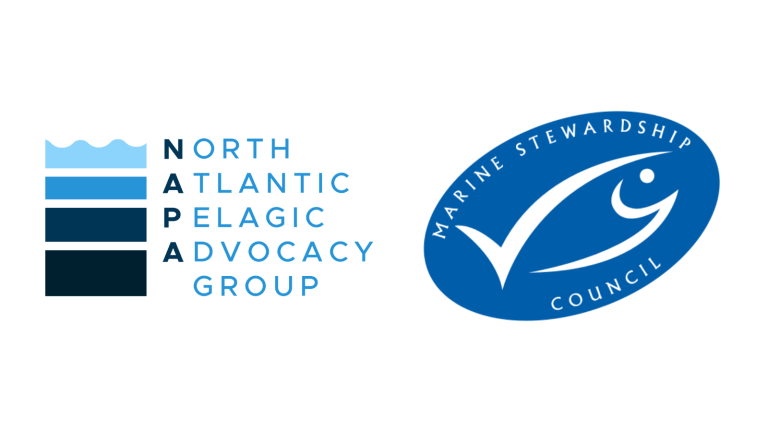Date of issue: 18 October 2022
Dear Fisheries Ministers,
We, The North Atlantic Pelagic Advocacy Group (NAPA), together with the Marine Stewardship Council (MSC), wish to draw your attention to unacceptable sustainability issues in the Northeast Atlantic – one of the most observed, assessed and rich areas for fishing in the world. Overfishing has been happening here, under your watch, since 2014.
Consistently fishing pelagic stocks above the scientific advice has the potential to throw this vital ecosystem out of balance – with knock-on impacts for the environment, fishers, consumers and the supply chain.
In 2019 and 2020, Marine Stewardship Council (MSC) certification was suspended from three iconic stocks due to poor governance and inadequate management: Northeast Atlantic mackerel, Atlanto-Scandian herring and blue whiting. Blue whiting also lost its MarinTrust certification, which is conditional upon the MSC standard.
These were your warning signs that significant management reforms were needed. It’s now 2022. No concrete steps have been taken to rectify the fundamental management flaws that are fuelling overfishing in the Northeast Atlantic. For that reason, the global marketplace for seafood is speaking up.
“The ALDI SOUTH Group is committed to responsibly source its fish and seafood range and increase the proportion of MSC-certified products in our stores. The current situation in relation to mackerel fisheries and herring fisheries causes us great concern. We urgently call on everyone involved to agree on a binding allocation of catch quotas, which are in line with scientific advice so that we can ensure sustainable fish stock in the future.” – Anke Ehlers, Managing Director Corporate Responsibility International department of the ALDI SOUTH Group
NAPA is an unprecedented coalition of more than 50 leading retailers and supply-chain businesses from across the world, who are publicly committed to the responsible sourcing of sustainable seafood. We are united by a common problem: certification loss is jeopardising the market’s ability to meet our commitments to people and the planet. In time, this could create far-reaching consequences for business security.
The obstacles are entirely political. As Fisheries Ministers, the solution lies with you and your fellow delegates.
We take this opportunity to remind you of your own commitments to sustainable fishing. All the Coastal States catching Northeast Atlantic pelagics have agreed to uphold the Sustainable Development Goals (SDGs), including SDG 14 on ‘life below water’:
By 2020, effectively regulate harvesting, and end overfishing, illegal, unreported and unregulated (IUU) fishing and destructive fishing practices and implement science-based management plans, to restore fish stocks in the shortest time feasible at least to levels that can produce maximum sustainable yield as determined by their biological characteristics.
Erin Priddle, MSC Regional Director, North Europe said: “The science is clear: sustainable, well managed fisheries provide the best chance at securing long-term economic and ecological certainty. We therefore urge nations to set aside national interests and commit to securing long-term science-based agreements for the Northeast Atlantic pelagic stocks during the 2022 annual negotiations. Global challenges – like climate change and political instability – may make reaching an agreement more challenging, however, these converging issues also highlight the urgent need to secure the future health of these stocks by progressing a quota share agreement in line with scientific advice.”
Our asks
As the decision-makers responsible for charting the future management of these fisheries, we are calling on you to take the following actions and show leadership at the upcoming Coastal States meetings in October, and at the North East Atlantic Fisheries Commission (NEAFC) meeting in November.
All Coastal States must take their fair share and prioritise resolving the allocation issues around these stocks.
Ensure that the overall catch for each stock does not exceed International Council for the Exploration of the Sea (ICES) scientific advice.
Management strategies detailing long‐term sustainability objectives should be the underlying approach by default.
Your lack of decisive action is already driving our members to re-think their purchasing decisions:
“The unfortunate consequence of this situation remaining unresolved and total catches continuing to be in excess of the ICES advice, is that Young’s would cease sourcing from these fisheries.” – Young’s Seafood, the UK’s largest seafood processor and NAPA member
“If these fisheries continue to fail to deliver the requirements of our sourcing policy and cannot agree on quota allocation and the implementation of an effective dispute mechanism, we will re-evaluate our sourcing choices with a view to only select Coastal States championing sustainability that actively support NAPA.” – Labeyrie-Fine-Foods, one of the leading French food suppliers and NAPA member
“We will only procure mackerel and herring from Coastal States that support responsible management of the fisheries targeting these species.” – Woolworths South Africa, a major South African retailer and NAPA member
The time has come to choose healthy stocks, healthy fisheries and healthy politics. We urge you not to walk away from stock management negotiations without a fair, collective agreement.
Regards,
The North Atlantic Pelagic Advocacy Group and the Marine Stewardship Council

Date of issue: 9 June 2022 Open letter from NAPA to politicians as major brands...
Read More >
Date of issue: 30 June 2022 The North Atlantic Pelagic Advocacy Group (NAPA) is the...
Read More >
Date of issue: 8 November 2021 The North Atlantic Pelagic Advocacy Group (NAPA) has announced...
Read More >